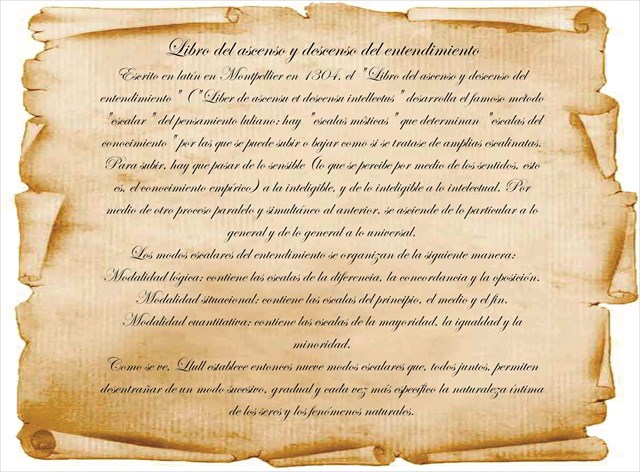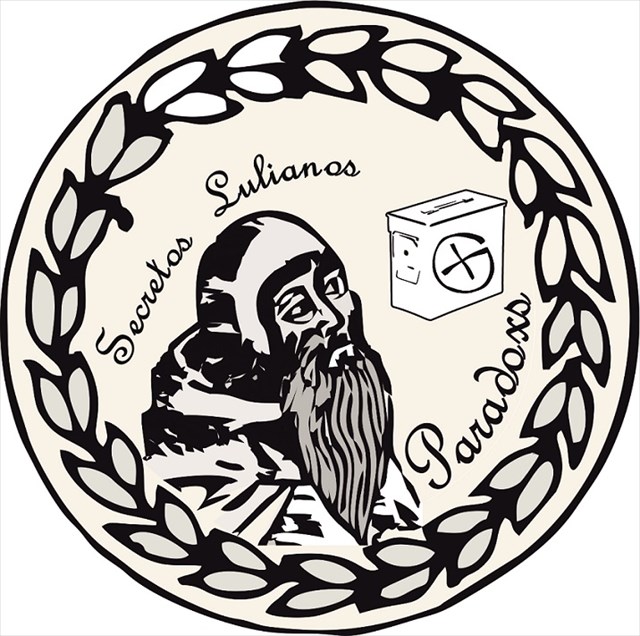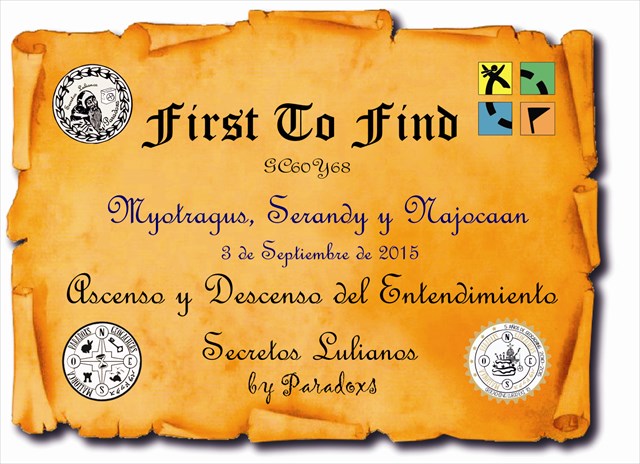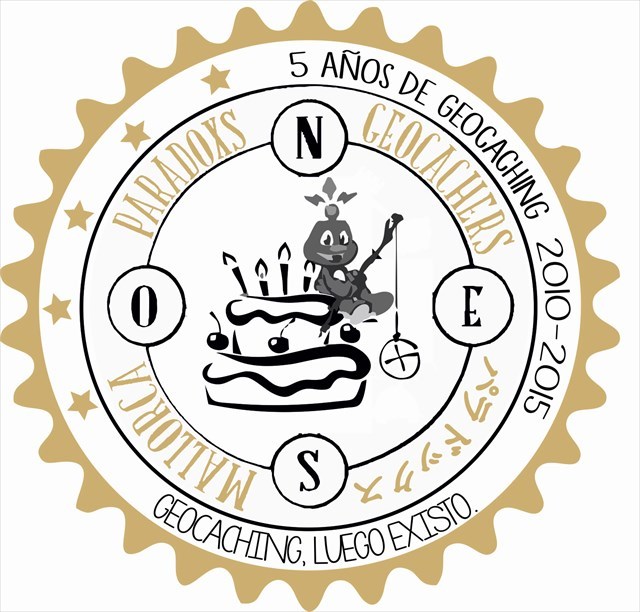Sa Cova des Beat
El Árbol de la Ciencia
La Máquina
El Razonamiento
Ascenso y Descenso del Entendimiento
El Fin de los Secretos
Los Secretos Lulianos es una serie de cachés que te adentrará en una aventura llena de curiosidades, misterios y secretos con la que queremos conseguir dos objetivos:
El primero es hacer memoria sobre el personaje de Ramón Llull, su vida, su obra y su pensamiento.
Además de ser considerado una figura muy importante en el uso de las lenguas, especialmente el de la lengua catalana escrita, también destaca la cantidad de campos en los que realizó aportaciones, destacando la Teología y la Filosofía. En cuanto a su obra y pensamientos, tomamos parte de ellos para representación de los Secretos, simplemente como reseñas y en algunos casos como solución si son interpretados desde los prismas adecuados.
El segundo objetivo es conducir esta aventura a las entrañas del bosque donde Ramón Llull encontró su hogar, en el monasterio de Miramar, entre el 1279 y el 1295. Para ello os conduciremos por algunos rincones significativos y otros tan nimios que son capaces de ocultar los más grandes misterios.
Esta serie es un desafío. Necesitarás varias horas para completarla, asi que no olvides traer suficiente agua y un calzado adecuado. Necesitarás mucha paciencia y tal vez un poco de ingenio. Y necesitarás traer tu propio boli/lápiz.
NO USES LA FUERZA PARA ABRIR LAS CAJAS. Y POR FAVOR DEJA TODO COMO ESTABA. SI NO ABRES LA CAJA Y ESCRIBES EN EL LOGBOOK, NO PUEDES REGISTRAR EL CACHÉ COMO FOUND.
Ascenso y Descenso del Entendimiento

Escrito en latín en Montpellier en 1304, el "Libro del Ascenso y Descenso del Entendimiento" (Liber de ascensu et descensu intellectus) desarrolla el famoso método "escalar" del pensamiento luliano: hay "escalas místicas" que determinan "escalas del conocimiento" por las que se puede subir o bajar como si se tratase de amplias escalinatas.
Para subir, hay que pasar de lo sensible (lo que se percibe por medio de los sentidos, esto es, el conocimiento empírico) a la inteligible, y de lo inteligible a lo intelectual. Por medio de otro proceso paralelo y simultáneo al anterior, se asciende de lo particular a lo general y de lo general a lo universal.
Los modos escalares del entendimiento se organizan de la siguiente manera:
Modalidad lógica: contiene las escalas de la diferencia, la concordancia y la oposición.
Modalidad situacional: contiene las escalas del principio, el medio y el fin.
Modalidad cuantitativa: contiene las escalas de la mayoridad, la igualdad y la minoridad.
Como se ve, Llull establece entonces nueve modos escalares que, todos juntos, permiten desentrañar de un modo sucesivo, gradual y cada vez más específico la naturaleza íntima de los seres y los fenómenos naturales.
Pista para el bonus: ¿De qué color es el contenedor?
Verde > E = 7 / Rojo > E = 6 / Negro > E = 4 / Marrón > E = 9



Beatified Man’s Cave
The Tree of Science
The Machine
The Reasoning
Rise and Fall of Understanding
The End of the Secrets
Lullian Secrets is a series of caches that offers you an adventure full of curiosities, mysteries and secrets, with which we want to achieve two objectives:
The first is to remember the character of Ramón Llull: his life, his work and his thought.
Besides being considered a very important figure in the use of languages - especially in written Catalan - he also stands out for the number of fields in which he made contributions, particularly in theology and philosophy. As for his work and thoughts, we take part of them to represent the Secrets, sometimes just as reviews, and in some cases as a solution if they are interpreted from the right point of view.
The second objective is to lead this adventure into the depths of the forest where Ramón Llull found his home - in the Miramar monastery - between 1279 and 1295. To do this, you'll walk through some significant corners and some other so trivial that they are able to hide the greatest mysteries.
This series is a challenge. You will need several hours to complete it, so do not forget to bring enough water and suitable shoes. You will need a lot of pacience and some wit. And you will need to bring your own pen.
DON'T USE FORCE TO OPEN THE BOXES. AND PLEASE LEAVE EVERYTHING AS YOU FOUND IT FOR THE NEXT GEOCACHER. IF YOU DON'T OPEN THE BOX AND WRITE IN THE LOGSHEET, YOU CAN NOT LOG THE CACHE AS FOUND.
Rise and Fall of Understanding

Written in Latin in Montpellier in 1304, the "Book of the Rise and Fall of Understanding" (Liber de ascensu et descensu intellectus) developed the famous method of "ladders" of Llull's thought: there exist "mystical ladders" that determine the "scales of knowledge" in which one can go up and down as if they were broad stairs.
To move up, one must pass from the sensible (what is perceived through the senses, that is, empirical knowledge) to the intelligible, and from the intelligible to the intellectual. Through a parallel and simultaneous process, you ascend from the particular to the general, and from the general to the universal.
The scalar modes of understanding are organized as follows:
Logic Modality: it contains the scales of difference, agreement and opposition.
Situational Modality: it contains the scales of beginning, middle and end.
Quantitative Modality: it contains the scales of majority, equality and minority.
As shown, Llull then sets out nine scalar ways that, together, allow to unravel in a successive, gradual and more specific way the intimate nature of beings and natural phenomena.
Hint for the bonus: What color is the container?
Green > E = 7 / Red > E = 6 / Black > E = 4 / Brown > E = 9



Beatified Man’s Cave
The Tree of Science
The Machine
The Reasoning
Aufstieg und Fall des Verständnisses
Das Ende der Geheimnisse
Lulianos Geheimnisse ist eine Cacheserie, die dir ein Abenteuer voller Merkwürdigkeiten, Mysterien und Geheimnissen bietet, bei denen es um zwei Dinge geht:
Erinnerung an die Person Ramón Llull: sein Leben, seine Arbeit und seine Gedanken.
Abgesehen davon, dass er eine wichtige Rolle beim Gebrauch von Sprachen - inbesondere beim geschriebenen Katalan- gespielt hat, fällt sein Name ebenso in weiteren Bereichen, zu denen er Beiträge geliefert hat (besonders in Religion und Philosophie). Durch seine Arbeit und Gedanken nehmen wir teil an den Geheimnissen, manchmal nur im Überblick, in einigen Fällen als Lösung, wenn sie vom richtigen Standpunkt aus betrachtet werden.
Das zweite Ziel ist es, das Abenteuer in die Tiefe des Waldes zu leiten, wo Ramón Llull zwischen 1279 und 1295 ein zu Hause gefunden hat: im Miramar Kloster. Dafür musst du einige bedeutende Stellen aufsuchen, sowie andere, die wiederum so nichtssagend aussehen, dass sie in der Lage sind, die größten Geheimnisse zu bewahren.
Diese Serie ist eine Herausforderung! Du wirst mehrere Stunden benötigen, vergess daher nicht genügend Wasser und geeignete Schuhe mitzunehmen! Du wirst eine Menge Geduld und Köpfchen benötigen. außerdem brauchst du noch einen Stift.
VERWENDE KEINE GEWALT BEIM ÖFFNEN DER DOSEN! UND HINTERLASSE BITTE ALLES, SO WIE DU ES VORGEFUNDEN HAST, DEM NÄCHSTEN CACHER. WENN DU DIE DOSE NICHT ÖFFNEN UND DICH NICHT INS LOGBUCH EINTRAGEN KANNST, DANN DARFST DU DIESEN CACHE AUCH NICHT ALS FOUND LOGGEN.
Aufstieg und Fall des Verständnisses

Geschrieben in Latein in Montpellier im Jahre 1304 entwickelte das "Buch vom Aufstieg und Fall des Verständnisses" (Liber de ascensu et descensu intellectus) die berühmte "Leiter"-Methode von Llulls Gedanken: es existiert eine "virtuelle Leiter" , die die "Stufen der Erkenntnis" bestimmt, auf der man auf oder absteigen kann, als wären es breite Stufen.
Um aufzusteigen, muss man sich vom Wahrnehmbaren (was durch die Sinne aufgenommen wird, Erfahrungswissen) zum Verständlichen, und vom Verständlichen zum Interlektuellen durcharbeiten. Durch einen parallelen und gleichzeitig stattfindenden Prozess kann man vom Besonderen zum Allgemeinen und vom Allgemeinem zum Universellen aussteigen.
Die Stufen des Verstandes sind folgendermaßen organisiert:
Logig: enthält die Stufen Unterscheidungen, Übereinstimmung und Opposition.
Situation: enthält sie Stufen Anfang, Mitte und Ende.
Quantität: enthält die Stufen Mehrheit, Gleichheit und Minderheit.
Wie aufgezeigt, hat Llull neun Stufen beschrieben, die zusammengenommen erlauben, in einer sukzessiven, graduellen und sehr spezifschen Weise, die vertraute Natur von Lebewesen und natürlichen Phänomenen zu enträtseln.
Hinweis für den Bonus-Cache: Welche Farbe hat die Box?
Grün > E = 7 / Rot > E = 6 / Schwarz > E = 4 / Braun > E = 9
Thanks a lot to Broiler for their translation!



